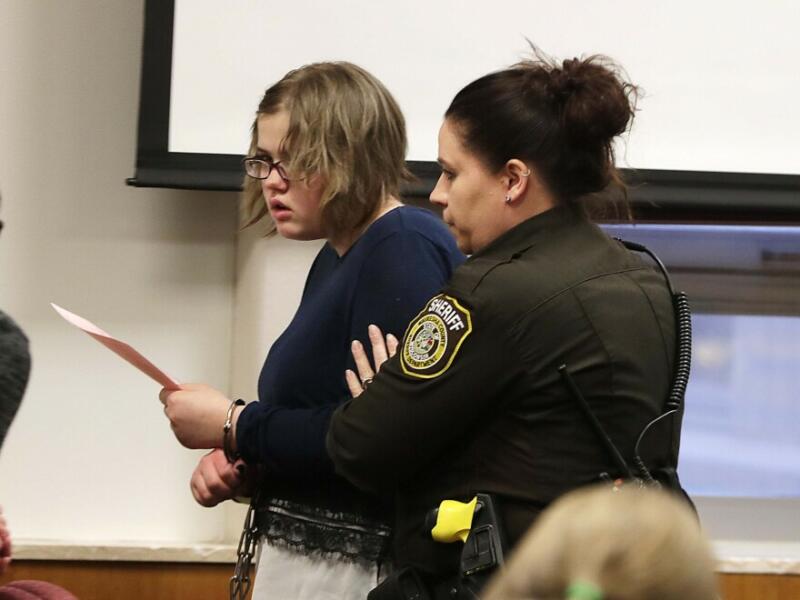On May 31, 2014, Morgan Geyser and her friend Anissa Weier lured their classmate Payton Leutner into the woods in Waukesha, Wisconsin, and stabbed her 19 times.
The girls claimed they committed the crime to please the fictional character Slender Man, a popular internet meme. In this post, we’ll look closer at Morgan Geyser’s life and what happened to her after the crime.
Who Is Morgan Geyser?

Morgan Geyser was born in Waukesha, Wisconsin, on May 16, 2002. She grew up in a middle-class family and was known to be an intelligent and creative child. Morgan loved reading books and writing stories and was an avid internet fan. She enjoyed browsing websites, playing video games, and chatting with friends online.
Morgan’s parents divorced when she was a child, and she lived with her mother, Angie, and her younger brother. According to court records, Morgan’s parents had a difficult relationship, and her father had a history of substance abuse and criminal behavior.
Despite these challenges, Morgan appeared to be a happy and well-adjusted child. She did well in school and had a close group of friends. Her teachers described Morgan as a bright, curious student who enjoyed learning new things.
Know About The Crime
On May 31, 2014, Morgan Geyser and Anissa Weier lured their classmate Payton Leutner into the woods in Waukesha, Wisconsin. The girls had been planning the attack for months and believed they had to sacrifice Payton to please Slender Man, a fictional character they had learned about on the internet.
Morgan and Anissa stabbed Payton 19 times and left her for dead. Miraculously, Payton survived the attack and managed to crawl out of the woods and find help. When questioned by the police, Morgan and Anissa claimed that they had committed the crime to become proxies of Slender Man and live in his mansion.
Legal Proceedings

Morgan and Anissa were charged with attempted first-degree intentional homicide and were initially found unfit to stand trial due to mental health issues. They both entered pleas of not guilty because of mental disease or defect, and their cases were transferred to juvenile court.
In 2017, Morgan entered a plea guilty to attempted first-degree intentional homicide. She was found not guilty because of a mental disease or defect and was sentenced to 40 years in a mental institution. Anissa was also found not guilty because of a mental disease or defect and was sentenced to 25 years in a mental institution.
Life After Sentencing
Since being sentenced, Morgan has been receiving treatment at a mental health facility. Her lawyers have said she is doing well and progressing in her recovery. In a statement read in court, Morgan apologized for her actions and expressed remorse for what she had done.
It is unclear when or if Morgan will ever be released from the mental institution. Her future remains uncertain, but her lawyers have said she is committed to improving and moving forward with her life.
Impact On The Victim’s Family And The Community
The attempted murder of Payton Leutner had a profound impact on her family and the community. Payton suffered severe injuries, including multiple stab wounds to her chest, abdomen, and arms. She spent six days in the hospital and underwent numerous surgeries to save her life.
Payton’s family has struggled to understand what happened in the aftermath of the attack. They described the experience as a nightmare and discussed the need for better mental health care and online safety measures to protect young people.
The community of Waukesha, Wisconsin, where the attack took place, was also shaken by the incident. Many residents expressed shock and disbelief that such a heinous crime could occur in their quiet, suburban town.
However, despite the trauma and pain caused by the attack, Payton and her family have shown remarkable resilience and strength. Payton has made a remarkable recovery and has returned to school and normal activities.
Her family has also worked to advocate for mental health awareness and founded a nonprofit organization, the Payton Leutner Foundation, to support other families affected by similar tragedies.
Wrapping It Up
In conclusion, Morgan Geyser’s case is a tragic reminder of the dangers of internet culture and the importance of mental health care. It’s a stark reminder that even the most intelligent and creative children can fall prey to harmful online content and that parents and educators must remain vigilant to protect them.
The case has also sparked important debates about the criminal justice system and how it handles cases involving mental health issues. Morgan’s sentence of 40 years in a mental institution has been criticized by some as excessively harsh, while others argue that it’s necessary to ensure public safety.
Ultimately, Morgan’s story raises important questions that we must grapple with. We must continue to work towards better mental health care and support for young people while also being mindful of the internet’s impact on our children’s lives. Only then can we hope to prevent tragedies like the one that befell Payton Leutner from happening again?
Also read: Where Is The Woman Who Stabbed Her Mother, Isabella Guzman?
























































